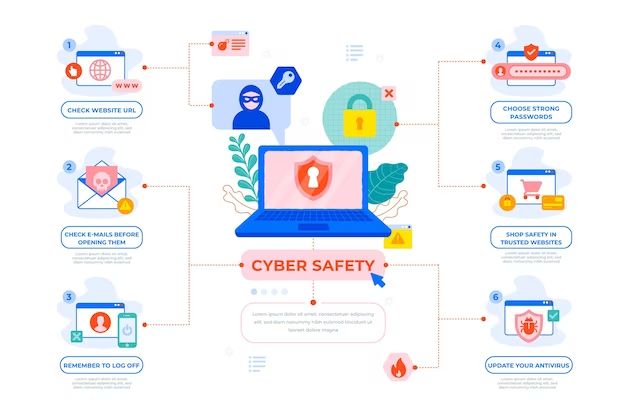Cybersecurity has become increasingly important in the digital age as more of our personal, financial, and business information is stored online. While cybersecurity may sometimes be seen as restrictive or inconvenient, strong cybersecurity measures provide important protections and benefits for individuals, businesses, and society as a whole. Here we will explore 5 of the key positive impacts of good cybersecurity practices.
1. Protection of personal information and identity
One of the most direct positive impacts of cybersecurity for individuals is the protection of personal information like names, birthdates, social security numbers, and financial data. Identity theft can have devastating financial and legal consequences, so securing data helps prevent criminals from accessing it. Good password hygiene, updating software regularly, avoiding phishing scams, and practicing other basic cybersecurity measures make it much harder for hackers to steal personal information. This gives individuals greater peace of mind and avoids the hassle of dealing with identity theft.
Cybersecurity measures like encryption and access controls also protect user privacy by preventing unauthorized access to data. This allows people to engage online without having to worry as much about their personal information being accessed or tracked without their knowledge or consent.
2. Financial protection for consumers and businesses
In addition to identity theft, poor cybersecurity exposes bank accounts, credit cards, and other financial information to potential criminal abuse. Consumers who have money stolen from their accounts or identities used to open fraudulent lines of credit can face major monetary losses if the cybercriminals are not caught. Strong security policies like multi-factor authentication and AI fraud monitoring make this criminal activity much more difficult and gives financial institutions better chances of stopping it before it causes damages.
Likewise, businesses that accept online payments or store customer financial data need robust cybersecurity to avoid becoming targets for hackers. Customers will avoid businesses that have poor records for protecting financial information. Companies that demonstrate strong security measures build trust and reassure customers that their financial data is safe, which is good for business. Investing in cybersecurity results in financial protection for both consumers and businesses.
3. Protection of intellectual property and trade secrets
Cybersecurity does more than just protect financial information – it is also critical for safeguarding a company’s intellectual property and trade secrets. Proprietary business information like product designs, manufacturing techniques, source code, and corporate strategies can be appropriated and exploited by competitors if not properly secured. As businesses digitize more of their proprietary data and increase remote access capabilities for new technologies like IoT devices and cloud computing, comprehensive cybersecurity becomes even more important.
Strong access controls and data encryption prevent unauthorized parties from easily accessing and copying sensitive internal data. Cybersecurity training helps employees recognize phishing attempts aimed at getting them to accidentally reveal passwords or other privileged information. Together these measures preserve intellectual property, giving businesses an edge over the competition and avoiding costly data breaches.
4. Increased productivity and continuous operations
Cybersecurity threats like malware, phishing, and denial-of-service attacks can severely impair business and organizational productivity. Malware may corrupt files, slow down systems, or even disable computers completely. Phishing schemes trick employees into activities that compromise data. Denial-of-service attacks render network resources inaccessible. Productivity grinds to a halt as critical systems are taken offline or employees deal with backlash instead of their normal responsibilities.
Proactive monitoring, access controls, multi-factor authentication, backups, and other fundamental cybersecurity practices greatly decrease the frequency and impact of these types of disruptive attacks. Keeping productivity high and avoiding costly downtime provides a real economic benefit. The high costs of ransomware attacks in cases where companies failed to implement basic security also demonstrate the potential value of continuous operations enabled by strong cyber defense.
5. Building of trust with customers and business partners
Consumers increasingly expect companies to provide robust cybersecurity as standard practice. Surveys show that a majority of customers will avoid companies that do not protect their data, and many would even pay more in order to have their data better secured. Weak cybersecurity is detrimental to a company’s reputation and erodes the trust needed for productive business relationships.
Investing in cybersecurity demonstrates to customers and partners that the company takes data protection seriously. It strengthens trust and reassurance that working with the company will not unduly expose sensitive information. This trust can create a competitive advantage over companies that lag in providing strong security. It also builds goodwill and confidence in the brand. In an environment with frequent cyberattacks and data breaches, good cybersecurity practices are a prerequisite for trust in digital relationships.
Conclusion
While cybersecurity can require trade-offs in cost, convenience, and accessibility, strong security measures provide substantial positive value for individuals, businesses, and society. They help protect privacy and identity, financial information and assets, intellectual property, business productivity and operations, trust with partners and customers. As cyber threats continue growing in frequency and sophistication, the importance of cybersecurity will only increase. Investing in proper cybersecurity will pay dividends across many facets of the digital economy and society.

